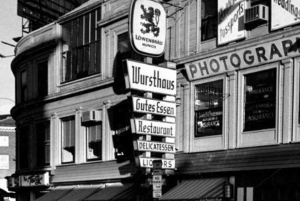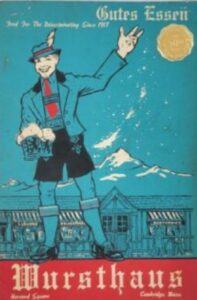By Sharon Oliver
Contributing Writer
CAMBRIDGE – The Wursthaus, a cavernous two-story German restaurant in the heart of Harvard Square, known for its heaping platters of comfort food and voluminous foreign beer list, was a Cambridge institution for nearly 80 years.

Stretching all the way back to 1917, the Wursthaus served crowd pleasing dishes like Black Forest steak, fancy stuffed fruit, imported German gingerbread, bratwurst, sauerbraten and weiner schnitzel as well as American favorites and satisfied hungry appetites up until its closing in 1996.
Purchase by Cambridge luminary
In 1942, Frank N. Cardullo, “the unofficial Mayor of Cambridge,” bought the restaurant and kept up the tradition of serving American and German dishes. Six years later, Cardullo launched the “Wursthaus To Your House” policy of a home service of cooked meals made for “people who work all day, and students occupied with their studies” with food being delivered “in a new station wagon.”
In 1974, the Wursthaus won a Silver Award in the German menus category of the National Restaurant Association’s Menu Ideas Exchange Contest. In 1975 and 1977, the beloved German restaurant was the recipient of a Bronze Award in the National Restaurant Association in the wine and beverage category. Also in 1977, the Wursthaus presented menus in Braille to assist those who were blind and in 1986, the Cambridge City Council backed a two-year-old order approving placement of 10 tables, with chairs and umbrellas, outdoors on the MBTA plaza. In 1978, Cardullo originated Harvard Square’s Oktoberfest.
With its vantage point at the corner of JFK Street, next to the subway stop and across the street from the Harvard Coop store, the Wursthaus was a popular gathering spot, loved for its German food, wine and imported beers from around the world. Now considered to be a prized vintage item, many can recall the uniquely beer stein shaped menu.

By the 1990s, the health-conscious, non-bratwurst easting masses helped contribute to a loss in revenue. Cardullo also felt that the extension of the subway’s Red Line, which enabled passengers to bypass Cambridge, had cut into Wursthaus’ customers.
Prominent customers
Famous patrons of the restaurant included U. S. Labor Secretary Robert B. Reich and Harvard President Derek C. Bok, who was a familiar face around breakfast time. Bok would spend early mornings at the hot spot drinking Wursthaus coffee and preparing for meetings in the cafe’s dark wooden booths. “It would be a shame for the restaurant to close,” Bok said in a 1993 interview with The Harvard Crimson. “There are certain restaurants, bookstores, and establishments that do a lot to define the special quality and tradition of the Square. The Wursthaus is one of those establishments.” The Muslim spiritual leader the Aga Khan, who favored the “hot-and-a-half-for-a-half” pastrami sandwich special, was also known to visit the restaurant occasionally.
End of an era
Cardullo owned the Wursthaus restaurant for almost fifty years and during that time its seating capacity grew from 50 to 500. He filed for Chapter 11 bankruptcy in early 1993 and the Wursthaus eventually closed in the summer of 1996. According to Cardullo, “As far as the restaurant closing, it’s the end of an era” and according to a Boston Globe article, Cardullo said that the restaurant could not provide its 35 employees with severance benefits. Furthermore, he also felt renovations shrouding the building in scaffolding was another deterrent which caused customers to be confused as to whether or not the business was open.
Cardullo also owned Cardullos’ Gourmet Shop which began as a deli on Boylston Street. (now JFK Street), as an extension of the Wursthaus Restaurant. The family sold the business, which sold imported and gourmet foods along with a large selection of fine wines, in 2015.
Frank Cardullo died the following year at age 82 after battling lung and heart disease. Family and friends of Cardullo created a scholarship in his name to be awarded to graduating students of Cambridge Rindge and Latin School with plans to pursue a career in the culinary arts.
RELATED CONTENT:
The Tasty was a Cambridge diner that served community spirit
After more than 50 years, Grendel’s Den is still going strong
Cambridge’s Club Passim helped launch the careers of many folk legends












